The FIA and Formula E announced Pit Boost ultra-fast EV recharging technology. This new element to the battery-power-only motorsport will be used in select races during the 2025 Formula E season. Pit Boost will be used first on February 14-15 during the Jeddah E-Prix in Saudi Arabia.
Why Formula E wants to add Pit Boost
Formula E was formed to advance battery-powered car competition and to explore ways to support sustainability in motorsports. Formula E is in its 11 season, and Pit Boost is the latest technology implementation. In addition to “greening” auto racing, Formula E is a showcase for EV tech that may appear in consumer vehicles in the future.
“Part of the FIA technical and sporting regulations, this pioneering new feature will add another strategic element to the sport, and underscores the FIA’s steadfast commitment to developing evermore advanced race-to-road technologies,” said Marek Nawarecki, FIA Senior Circuit Sport Director.
How Pit Boost will be implemented
Formula E teams must perform Pit Boost during designated races in Season 11. Two Pit Crew members will perform the boost, and another person will stop and release the car.
The Pit Boost will be a mandatory 34-second stationary pit stop. For 30 seconds, the ultrafast 600 kW charging technology will add 3.85kWh to the car, which is approximately 10% of the battery capacity and significantly improves power.
Teams must incorporate the mandatory Pit Boost pit stop in their race strategy. For example, while the Pit Boost will add energy, providing a tactical edge near the end of the race, the stop timing could result in giving up the race position. This feature and Formula E’s Attack Mode rules add complexity to race planning.






